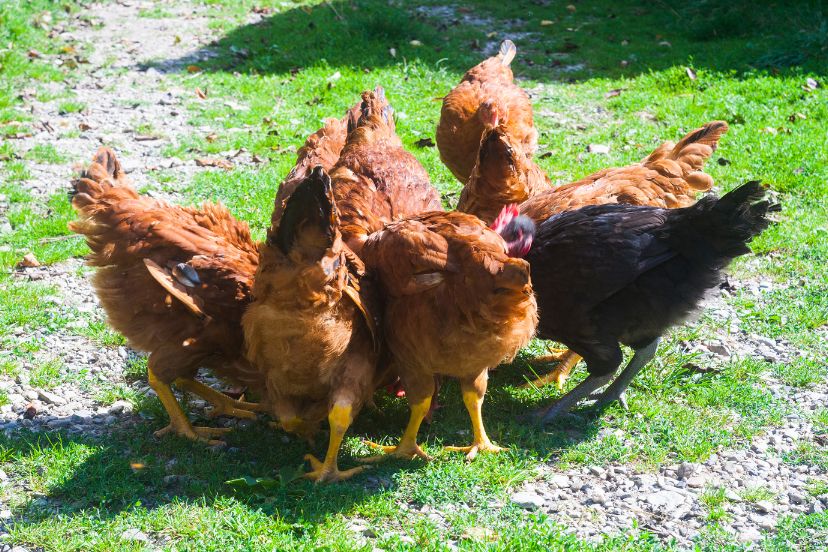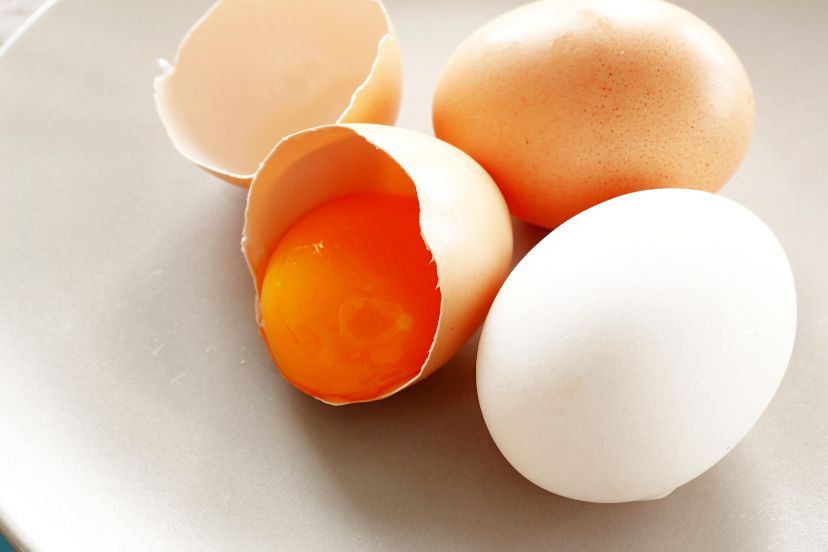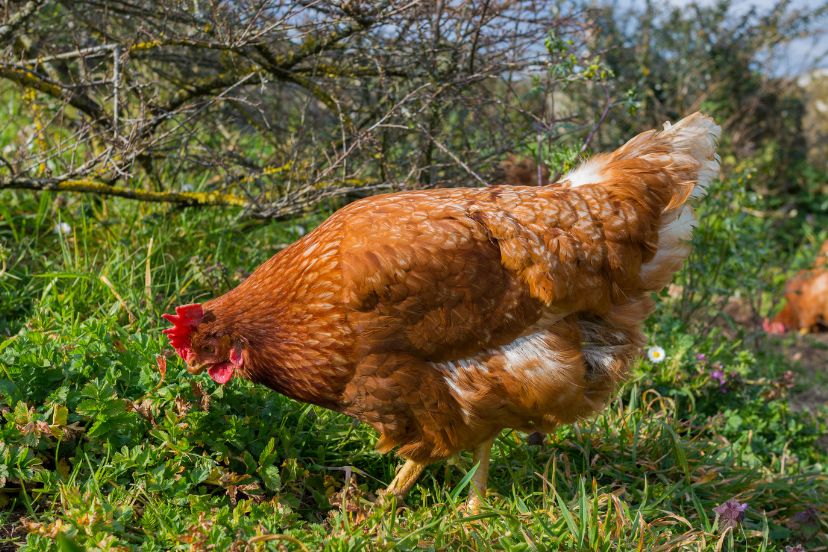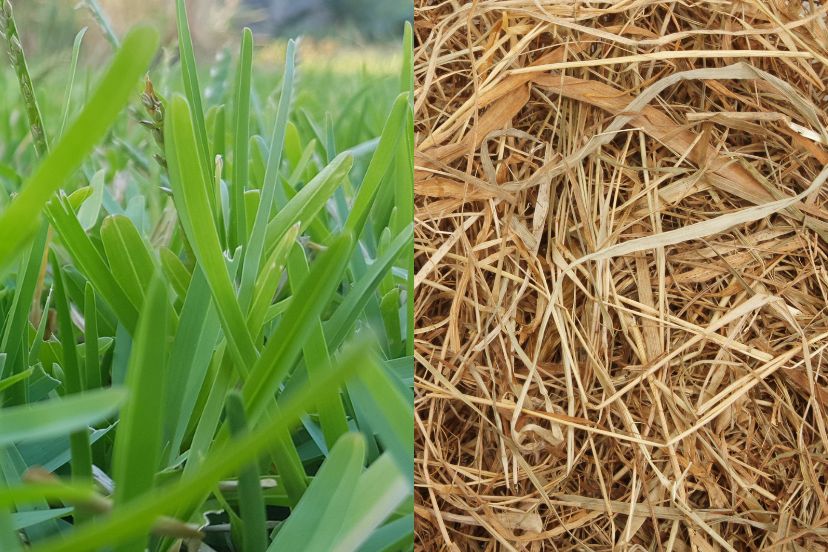Do Chickens Eat Grass?
I often get asked, “Do chickens eat grass?” The answer is yes, they do! Chickens are not just grain-gobbling creatures; they love grass and many other types of vegetation. Now, let’s take a closer look at why grass forms a vital part of a chicken’s diet.
Are Chickens Herbivores?
While chickens love grass and vegetation, they’re not strictly herbivores. They’re omnivores, which means they eat both plants and meat. Think of them as the feathered version of us humans when it comes to diet! They’re known to eat almost anything, from grains, fruits, vegetables, to small insects, worms, and, yes, grass!
The Role of Grass in a Chicken’s Diet
A stroll across a lush green field filled with chickens pecking away at the ground is a common pastoral scene. It’s not mere curiosity that drives chickens to graze all day. Rather, it’s an instinctive behavior prompted by their need to incorporate grass into their diet.
Grass, for chickens, is more than just a green carpet on the ground. It’s an endless buffet of essential nutrients and tasty treats. Not only is it packed with nutritional goodness, but grass also conceals a variety of delectable morsels such as insects, seeds, and fresh sprouts, which chickens find utterly irresistible. This is why you’ll often see them spending a good part of their day pecking and scratching away at the grass.
Grass consumption has several significant benefits for chickens. The fiber in grass aids in digestion and promotes overall gut health. It acts as roughage, which aids in the movement of food through a chicken’s digestive system. This not only helps keep their system clean but also reduces the risk of digestive issues such as impacted crops.
Grass is also a source of crucial vitamins and minerals, such as Vitamin A and calcium, which are essential for the growth, development, and overall health of chickens. Vitamin A, for instance, aids in the health of their feathers and eyesight, while calcium is crucial for strong eggshells.
Moreover, grass contains carotenoids – pigments that give color to vegetables. When chickens eat grass, these carotenoids can end up influencing the color of their egg yolks, resulting in those rich, yellow to orange yolks that are often associated with free-range or pastured eggs.

Grass plays a critical role in a chicken’s diet by providing essential nutrients, promoting digestive health, and encouraging natural behaviors. Understanding this can help us ensure that our feathered friends lead healthier and happier lives.
The Impact of Grass on Egg Quality
When you crack open an egg from a chicken that has been feeding on grass, you might be pleasantly surprised to see a yolk that’s darker and richer than what you might find in a standard store-bought egg. This is not merely a cosmetic difference. It’s a direct consequence of the chicken’s diet, particularly its consumption of grass, and it signifies a notable impact on the egg’s nutritional profile and flavor.
To understand why grass consumption affects egg quality, we first need to appreciate the nutritional value of grass. It contains carotenoids, which are natural pigments that also provide health benefits. These carotenoids are responsible for giving the egg yolks their distinctive dark color.
When chickens consume grass, they’re also ingesting these carotenoids. Some of these carotenoids, such as xanthophylls, aren’t broken down during the metabolic process and are instead deposited into the yolk, which leads to the rich, vibrant yellow, or even orange, yolk color often associated with grass-fed or free-range eggs.
But the influence of grass on egg quality extends beyond just color. Those same carotenoids also have antioxidant properties. This means that eggs from grass-fed chickens can contain higher levels of antioxidants, which are beneficial for health.
Furthermore, the nutritional richness of grass also contributes to the flavor of the eggs. Many people claim that eggs from grass-fed chickens have a fuller, more robust flavor compared to those from chickens that have been fed only on grain.
Grass-fed chickens are also more likely to consume a varied diet, pecking at bugs, seeds, and other vegetation in addition to grass. This dietary diversity can contribute to a complex flavor profile in the eggs, making them a favorite among many gourmets. So, the next time you enjoy an egg from a grass-fed chicken, remember to thank the humble blade of grass!

The impact of grass on egg quality is multifaceted. It contributes to a darker, richer yolk color, enhances the nutritional profile of the eggs by increasing the levels of antioxidants, and imbues the eggs with a more robust and complex flavor.
How Chickens Eat Grass
Chickens, despite being part of our everyday farmyard sightings, have a rather unique and fascinating method of eating, especially when it comes to grass. Unlike us humans, or other animals like cows and sheep that have teeth to grind down their food, chickens don’t have teeth. So how do these feathered creatures manage to consume grass, you may wonder? The answer lies in their distinctive pecking and scratching behavior, and their specially adapted digestive system.
The Pecking and Scratching Method
If you observe chickens in a field, you’ll notice that they have a distinctive way of eating. They peck at the grass with their beaks, tear off bits, and then swallow them. This action of pecking and swallowing is a chicken’s way of ‘chewing’.
But that’s not the whole story. Along with pecking, chickens also engage in what’s called ‘scratching’. They use their strong legs and sharp claws to scratch at the ground, revealing hidden treats like bugs, seeds, and sprouts that were concealed beneath the grass or soil. This scratching behavior not only aids in their feeding but also serves as a form of foraging, keeping the chickens active and engaged with their environment.
Once the grass and other foods are swallowed, they pass into the chicken’s crop – a sort of storage pouch in the chicken’s throat where the food can be softened. From there, the food moves into the gizzard, a powerful organ that acts like a second stomach. The gizzard contains small pieces of grit and stone that the chicken has swallowed. Through muscular contractions, the gizzard uses this grit to grind down the food, much like how we would use our teeth.
The ground-up food then continues through the rest of the digestive tract, where nutrients are absorbed, contributing to the chicken’s health and, in the case of hens, the production of eggs.
So, while chickens may not have teeth, their unique method of pecking, scratching, and utilizing a gizzard allows them to effectively consume and gain nutrition from grass and other foods in their diet. This is yet another testament to the fascinating adaptability of these common, yet extraordinary birds.

The pecking and scratching behavior involved in consuming grass stimulates their natural foraging instincts. This not only keeps them physically active but also mentally stimulated, which is crucial for their overall wellbeing.
Grass and Chicken Health
When it comes to understanding the dietary needs of chickens, the role of grass cannot be underestimated. It’s more than just a snack or a distraction; it serves as a vital health booster. Consuming grass benefits chickens in several ways, particularly by improving their digestive health and boosting their immunity. Let’s delve deeper into these benefits.
Improving Digestive Health
In many ways, the digestive system of a chicken is a marvel of efficiency, capable of extracting nutrients from a wide variety of food sources. Grass plays an essential role in this process by providing necessary fiber, which aids in digestion.
Fiber acts as a natural cleanser for a chicken’s digestive tract. It bulks up the food, helping to keep things moving smoothly through the digestive system. The fiber in grass is particularly beneficial for chickens because it serves as roughage. This roughage aids in the movement of food through the chicken’s crop and gizzard, where it is ground down, and then into the intestines for nutrient absorption.
A healthy and efficient digestive system is less prone to common issues like impacted crops or sour crops. By eating grass, chickens can maintain a cleaner and more effective digestive system, which, in turn, allows them to absorb more nutrients from their food and produce healthier, better-quality eggs.
Boosting Immunity
The benefits of grass for chickens extend beyond just digestion. Grass is a rich source of various vitamins and minerals that can help bolster a chicken’s immune system.
For instance, grass contains Vitamin A, a crucial nutrient for chickens. Vitamin A supports various aspects of a chicken’s health, including the health of their skin, feathers, and eyes. It also plays a critical role in supporting the immune system, helping the bird to fend off diseases and infections.
In addition to Vitamin A, grass also contains calcium, which is essential for the production of strong eggshells in laying hens. A deficiency in calcium can lead to thin or soft eggshells, or even egg-binding, a potentially serious condition where the hen struggles to lay her eggs.
By consuming grass, chickens can ingest these and other important nutrients, thereby improving their overall health and boosting their immunity. This not only makes for healthier, happier birds but also contributes to a more productive and sustainable flock. Thus, grass proves to be not just a dietary element but an integral part of a chicken’s wellbeing.
Fresh Grass vs. Dried Grass
When it comes to the role of grass in a chicken’s diet, not all grass is created equal. The nutritional value and benefits it offers can vary depending on whether it’s fresh or dried. But rest assured, both forms of grass have a place in a chicken’s dietary regime.

Our goal is to ensure that our feathered friends receive a balanced, nutrient-rich diet, and both fresh and dried grass can play an important role in achieving this aim.
Fresh Grass
Fresh grass is the first choice for feeding chickens due to its high nutrient content. It’s packed with vitamins, minerals, and beneficial plant compounds that can enhance the health and wellbeing of chickens. Notably, fresh grass contains higher levels of certain nutrients, such as Vitamin A and carotenoids, which are known to support eye health and give egg yolks their vibrant color, respectively.
Moreover, fresh grass offers more hydration than dried grass. Just like other fresh greens, it contains a good amount of water, which can help hydrate chickens, particularly on hot days. The act of foraging for fresh grass also promotes natural behaviors, enriching the chicken’s environment and contributing to their psychological wellbeing.
Dried Grass
On the other hand, dried grass, often available in the form of hay, is a great alternative when fresh grass isn’t readily accessible. This might be the case during colder months, in dry climates, or for urban chicken-keepers without access to pastured areas.
While dried grass does lose some vitamins during the drying process, it still retains a fair amount of nutrients, including minerals and fiber. This makes it a valuable dietary supplement, especially in winters when other food sources might be scarce.
Dried grass also provides an added advantage when it comes to storage. It’s easier to store in large quantities without the risk of spoilage, making it a reliable reserve to keep your chickens fed and happy, even in less-than-ideal conditions.
In conclusion, while fresh grass is always the best choice due to its higher nutrient content and hydration benefits, dried grass is a commendable alternative. It provides necessary fiber and certain minerals and can serve as an essential food source when fresh grass isn’t available.
Tips for Safe Grass Consumption
As we’ve established, grass is an excellent addition to a chicken’s diet. However, to ensure the health and safety of your flock, it’s vital to consider the quality of the grass they’re consuming. Not all grass is safe, especially if it’s been treated with chemicals such as pesticides or fertilizers. Here are some crucial tips for ensuring safe grass consumption for your chickens.
Avoid Chemically Treated Areas
When allowing your chickens to free-range or when sourcing grass for their feed, steer clear of areas that have been sprayed with pesticides, herbicides, or chemical fertilizers. These substances can be ingested by the chickens and pose significant health risks. Symptoms of exposure can range from mild illness to severe toxicity, affecting their nervous system and causing a decrease in egg production, among other things.
Wait It Out
If your yard or pasture has been recently treated, it’s crucial to wait for a sufficient period before allowing your chickens to graze there. The wait time will depend on the specific chemicals used, so it’s best to refer to the manufacturer’s instructions. As a general rule, it’s better to wait longer than risk exposure.
Opt for Organic Alternatives
If you need to control pests or boost your soil’s fertility, consider using organic alternatives to traditional pesticides and fertilizers. Organic options are typically safer for chickens and other wildlife. For example, introducing beneficial insects can help control pests, and organic compost can be an excellent soil conditioner.
Provide a Balanced Diet
While grass is beneficial, remember that it shouldn’t be the only food source for your chickens. Providing a balanced diet, including commercial chicken feed, grains, and kitchen scraps, ensures that your flock gets all the nutrients they need. Too much of anything, even grass, can lead to nutritional imbalances.
Conclusion
So, yes, chickens do eat grass and it provides a plethora of benefits, from enhancing egg quality to boosting their health. However, we need to balance this aspect of their diet with other food sources and safe practices. This way, we can ensure the overall health and happiness of our flocks, providing them with the nutrients they need and the quality of life they deserve.
FAQs
Do chickens eat only fresh grass? No, chickens can eat both fresh and dried grass, although fresh grass is more nutritious.
Can chickens eat grass clippings? Yes, but make sure the grass hasn’t been treated with any harmful chemicals.
Does grass affect the color of egg yolks? Yes, grass contains carotenoids, which can darken the color of egg yolks.
Do all types of chickens eat grass? While preferences may vary slightly among breeds, all chickens will typically consume grass.
Can a diet of only grass sustain a chicken? No, chickens need a balanced diet that includes grains, proteins (from bugs and worms), and other greens along with grass.




